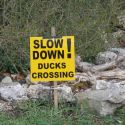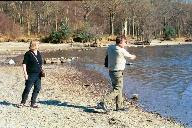Consider going to St Helena’s monthly book sale. Last Wednesday of every month. Hardbacks a euro and paperbacks 50 cents. But know we would yield to temptation and come home with books totally surplus to requirements. What we should actually be doing is donating a couple of books.
Currently reading aloud Breaking News: The Remaking of Journalism and Why it Matters Now, by Alan Rusbridger, former editor of the Guardian. Part memoir but largely a look at journalism in a time of incredibly rapid change, technologically, but also socially, as the age of the internet changed everything about providing and accessing news. As we read yesterday we were remembering our early internet experiences. Even with unbelievably slow dial-up - can remember going in to the school on a Saturday to access the Times and taking a book for the endless connection wait times - it was obvious that the internet was going to be a great leveller.
Remembering the teachers’ strike in 1997 (and thanks to the internet not simply guessing at the year). We went down to Dryden for a meeting with Federation people from Toronto. They asked if we wanted to see the articles on the strike from yesterday’s papers. We did. But I then had the pleasure of asking if they wanted to see the opinion pieces from today’s papers. And they did. An interesting freeze frame. The point at which I could access Toronto papers via dial-up and print the articles but Toronto professionals were not waking up in Dryden motels to their own personal access. A point at which the Times of London was already online, in some form at least, but Alan Rusbridger was struggling to understand what the implications of the net were going to be and wondering what role the Guardian would play.
Interesting discussions last week with people at Jane’s birthday re e-reading. Hazel said she had no interest at all in wifi but loved having a newspaper to read. Didn’t say, but thought, of course, but that limits you to one, or at most two mainstream newspapers, say a UK non-tabloid and the one Cypriot English language daily. With all the limitations of slant and content choice. The other conversation began with Rowena asserting that she only liked real books, their physical presence. And they do have some advantages besides the pleasures of texture and colour and weight and scent - weight not always an asset, but that’s another matter. Most obviously with ebooks there is the number it’s possible to carry. And the ability to adjust type size and screen brightness. But there’s also the fact that once the decision to buy a book has been made, it’s easy to be reading it fifteen minutes later. And, as J pointed out many scanned books are available that may never be reprinted. Think Rowena wavered slightly when he mentioned the (free) ebook recounting a man’s travels in Cyprus in the late nineteenth century. Actually, it’s odd, but people often seem to attach an obscure virtue to preferring real books, as opposed to seeing it as personal preference. A little like early risers.
.




